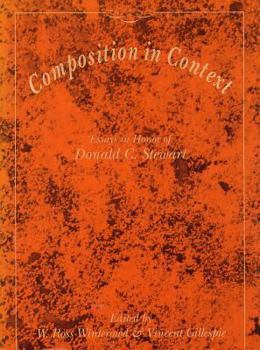Composition in Context: Essays in Honor of Donald C. Stewart
This collection of sixteen essays, authored by major scholars in the field of composition and rhetoric, offers an eclectic range of opinions, perspectives, and interpretations regarding the place of composition studies in its academic context. Covering the history of rhetoric and composition from the nineteenth century to the present, the collection focuses on the institutional and intellectual framework of the discipline while honoring Donald C. Stewart, a man who addressed the central paradox of the field: its homelessness as a discipline in an academic community that prides itself on specialization.
Over the past two decades composition--grounded in rhetorical tradition--has emerged as a foundation for liberal and professional studies. These essays, furthering the often disputed point that composition is indeed a discipline, are divided into three parts that examine three crucial questions: What is the history of composition's context? How does composition function within its context? How should we interpret or reinterpret this context?
In the first part, the essayists investigate the history of composition teaching, noting the formative influences of the eighteenth-century Scottish rhetoricians in the development of the American tradition as well as the effect of composition on education in general. The essayists question the public perception of rhetoric as the art of flimflam and examine the rise of expressive writing at the expense of argumentation and persuasion.
In part 2, the contributors make clear that composition is a discipline in the process of defining itself. They explore the role composition plays in universities and the ways in which it seeks focus and purpose, as well as formal justification for its existence.
In the last section, the authors scan the very edge of the field of composition and rhetoric, from examinations of the nature of the composing imagination and of the question of dialogue as communication to feminist theoretical approaches that attempt to bridge the differences between the New Romantics' and New Rhetoricians' composing models. The essays are enhanced by the coeditors' witty and perceptive introduction and by Vincent Gillespie's tribute to Donald Stewart.
Related Subjects
Language Arts Literary Literary Criticism & Collections Literature Literature & Fiction




